
October 12
1810 Bavaria: The origin of Oktoberfest:
Bavarian Crown Prince Louis, later King Louis I of Bavaria, marries Princess Therese von Sachsen-Hildburghausen. The Bavarian royalty invited the citizens of Munich to attend the festivities, held on the fields in front of the city gates. These famous public fields were named Theresienwiese—"Therese's fields"—in honor of the crown princess; although locals have since abbreviated the name simply to the "Wies'n." Horse races in the presence of the royal family concluded the popular event, celebrated in varying forms all across Bavaria.
The decision to repeat the festivities and the horse races in the subsequent year gave rise to the tradition of the annual Oktoberfest, which now begins in late September and lasts until the first Sunday in October. Alcohol consumption is an important part of the modern festival, and more than 1 million gallons of beer are consumed annually at Oktoberfest. (History.com)
1861: The CSS Manassas becomes the first ironclad to enter battle. Converted from a commercial vessel in New Orleans for river and coastal fighting, she fights Union warships on the Mississippi this day. (Hill)
1891 Birth: Saint Edith Stein: German scholar and Carmelite nun; executed by Nazis because of Jewish background. (AP)
1914 World War I: Various:
The first battle for the Belgian city of Ypres begins:
Under the command of Field Marshall Sir John French, the British Expeditionary Force (BEF) retreated to Ypres after Antwerp fell. They arrived there between 8 and 19 October to bolster the Belgian and French defence. The Allied position around Ypres took the shape of a small salient in the trench lines because it could best be defended from the low ridge of higher ground to the east, but it was vulnerable to superior German artillery. The BEF held a thirty-five mile long line in the centre of the bulge while the French Army in the area, commanded by General Ferdinand Foch, manned the flanks to the south of the city.
At the outset of the battle, French and Foch both retained the hope of launching an offensive of their own. They believed a coordinated attack would enable the Allies to recapture the industrial city of Lille, Belgium, followed swiftly by Brussels. The new German Army Chief of Staff, Falkenhayn, quickly corrected their optimistic beliefs. [For further details, Click Here.]
List Regiment (Oct 11 - 20):
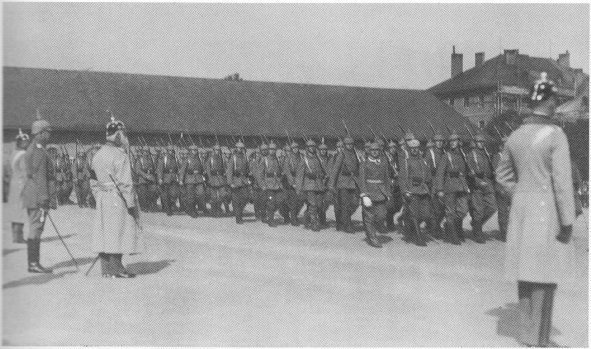
Infantry Recruit Adolf Hitler's 1st Company, 16th Bavarian Reserve Infantry, train at Lechfeld, at the confluence of the Lech and the Danube, seventy miles west of Munich. [For further details, Click here.]
German forces recapture the city of Lille in Belgium.
From the diary of the List Regiment's chaplain, Father Norbert:
Lille, and in particular the central station, was a terrible sight. The entire train station was a shambles. The wounded lay everywhere. 1,200 houses were said to have been destroyed in the bombardment, most of them grandiose buildings. There were burnt-out gables and smoking piles of rubble everywhere, along with crying and begging women and children, and withdrawn, sullen men . . . .
In the military hospitals—of which there are fifteen in the city—lie about 4,000 soldiers, most of them seriously wounded, but no clergymen; the French priests are not allowed to visit the injured due to fear of espionage.
Hindenburg: outnumbered more than three to one, halts the Polish offensive.
1915 Various:
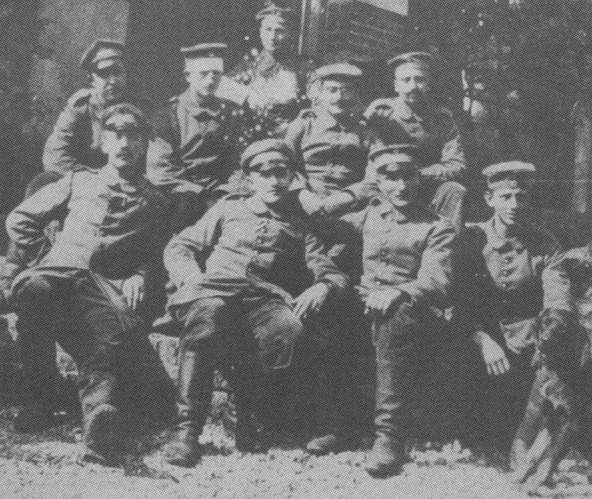
List Regiment (Oct 7 - 14): Gefreiter Adolf Hitler's regiment serves with 16 Reserve Infantry Regiment at Fromelles. [For further details, Click here.]
Former President Theodore Roosevelt criticizes US citizens with dual nationalities, referring to them as 'Hyphenated Americans.'

The men who do not become Americans and nothing else are hyphenated Americans; and there ought to be no room for them in this country. The man who calls himself an American citizen and who yet shows by his actions that he is primarily the citizen of a foreign land, plays a thoroughly mischievous part in the life of our body politic. He has no place here. [For further details, Click here.]
1916 List Regiment (Oct 9 - Dec 3):
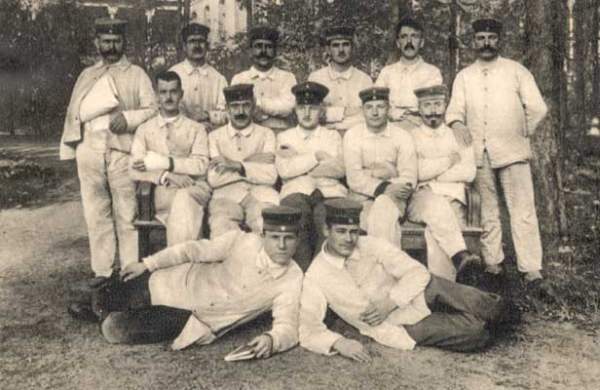
Hitler, who had been fighting almost continuously for two years, finds himself on a hospital train headed for a Red Cross hospital in Beelitz, near Berlin. While his wound is serious, he will recover quickly, and will later write Balthaser Brandmayer: "Am suffering from hunger-induced typhus because I cannot eat bread; additionally I am adamantly denied any sort of jam." [For further details, Click here.]
1917 World War I (Sep 30-Oct 17):
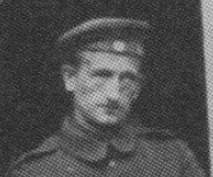
1918 World War I (Sep 28-Oct 15):
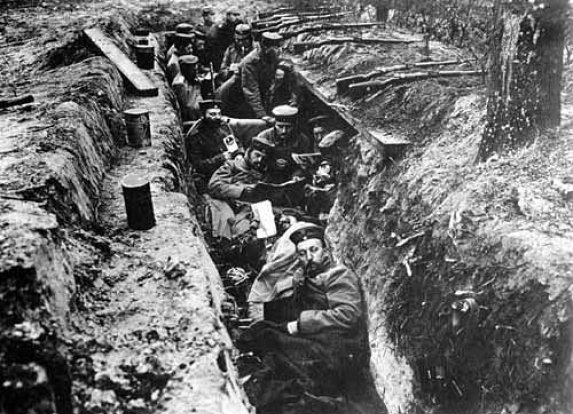
Gefreiter Adolf Hitler participates in defensive operations in Flanders with 3 Company, 16 Bavarian Reserve Infantry Regiment. [For further details, Click here.]
1920 Polish-Soviet War: Preliminary peace treatyis signed in Riga between Poland and Soviet Russia:
Although it is usually glossed over in many Western History college courses, the Russo-Polish War was a pivotal event in twentieth century history, "the most portentous event facing post-Versailles Europe," according to Yale historian Piotr S. Wandycz. Had Poland been overrun, the Soviet Union could, theoretically, have invaded Germany. Thus not only did Poland deal the Red Army its first defeat, it also greatly expanded the territory of the fledgling republic to its historic, pre-partition borders. [For further details, Click here.]
1930 Weimar: The Graf Zeppelin:

The first commercial dirigible to cross the Atlantic, embarks on its maiden voyage. The Graf Zeppelin, named after its inventor, Ferdinand von Zeppelin, will make more than five hundred transatlantic passenger flights before it is retired in favor of the hydrogen-inflated Hindenburg.
When completed, the airship was 100 feet in diameter, and 110 feet high including the gondola bumpers, bringing her within TWO FEET of the rafters of her shed. Many new [sic] innovations were incorporated into the Graf Zeppelin during her construction in Factory Shed number II in Friedrichshafen. The most revolutionary of the innovations was the inclusion of a new fuel system for the engines. Previously, all airships had used engines that burned either gasoline or diesel fuel. The main problem with using a liquid fuel was that as you burned off the gas or diesel, you lost weight, and as you lost weight, you had to vent off hydrogen to keep from floating up. This had been a problem that had plagued zeppelins since the beginning, but was solved in the building of the Graf. The Graf had special gas cells installed below the gas cells that housed the lifting hydrogen gas. [For further details, Click here.]
1939 World War II: Various:
Memorandum by the State Secretary in the German Foreign Office (Weizsaecker):
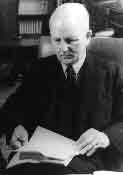
The Bulgarian Minister, supplementing his recent conversation with the Reich Foreign Minister, informed me today of the following: The suggestions recently made by Molotov to the Bulgarian Government concerning a Russian-Bulgarian agreement were not clear at first. Later it became evident that Molotov was thinking of a Russian-Bulgarian mutual assistance pact in the event of attack by a third power. This suggestion was rejected in Sofia. To my question why Bulgaria did not accept it,
Draganoff offered as his own conjecture the following: Up to now Bulgaria had never concluded any treaty of alliance of this kind, not even with Germany, to whom she has for long had close ties. Probably his Government did not, for this reason, wish to swerve from this principle nor, above all, conclude a mutual assistance pact with Russia first. Draganoff then went on to say that the Bulgarian Government made the following counter proposal: Bulgaria was ready to conclude a treaty of non-aggression or friendship with Russia if Moscow would present concrete proposals of this kind. A reply to this has not as yet reached Sofia. I thanked the Ambassador for the information and promised to transmit it to the Reich Foreign Minister.
Chamberlain—following the previous day's declaration by France to the same effect, rejects Hitler's offer of peace; saying that it would amount to forgiving Germany for all its aggression.

Poland: Hans Frank is appointed Chief Civilian Officer in occupied Poland. (THP)
Holocaust: The Nazis begin deporting Jews from Austria and Moravia to Poland. (THP)
War at Sea:
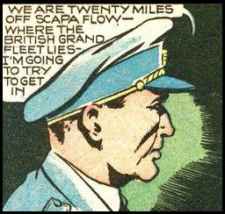
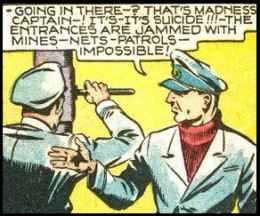

Guenther Prien announces to the crew of the U-47 that their mission is to attack the protected harbor of Scapa Flow. The German submariners listen in stunned silence, believing the mission to be suicidal.
1940 World War II: Various:
Operation Sea Lion: In a decision that will come back to haunt him, Hitler abandons the planned German invasion of Britain.
[See: What Were Adolf Hitler's Major Blunders?]Rumania: A German military mission is set up in Bucharest, for the purpose of aiding in the training of the Rumanian army.
1941 World War II: Various:
Barbarossa: German forces under von Bock capture Kaluga. The majority of the Russian government moves from Moscow to the Volga as the Nazis close in on Moscow. Stalin, however, remains in the capital.
From the Diary of Rear Admiral Giichi Nakahara:
Commander in Chief (Yamamoto) visited those dependants whose heads are officers and warrant officers, and Chief of the Personnel Department (Nakahara) those dependants whose heads are EM. Some EM don't hope to live to see their native land again in this expedition, and testaments were written already. German troops have come as near as 104 kilometers from Moscow. The whole city is in a commotion. (Dillon)
[See: Countdown to Infamy: Timeline to Pearl Harbor.]1942 World War II: Various:
President Franklin Delano Roosevelt Fireside Chat:
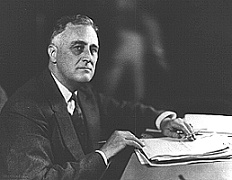
The United States has been at war for only ten months, and is engaged in the enormous task of multiplying its armed forces many times. We are by no means at full production level yet. But I could not help asking myself on the trip, where would we be today if the Government of the United States had not begun to build many of its factories for this huge increase more than two years ago -- more than a year before war was forced upon us at Pearl Harbor. We have also had to face the problem of shipping.
[See: Why Did the US Join the Fight Against Hitler?]FDR to Stalin:
I am examining every possibility of increasing the number of fighter planes to be sent to the Soviet Union. The fact of the matter is that all Aircobra production is now going to fighting fronts immediately. While these urgent combat requirements make it impossible to increase the number of Aircobras for you at the moment, nevertheless I am hoping to increase our production of this type at the expense of other types in order to give you more planes.
Also if our forthcoming operations which you know about turn out successfully as they promise, we would then be in a position to release fighters. Our heavy bombardment group has been ordered mobilized immediately for the purpose of operating on your southern flank. This movement will not be contingent on any other operation or commitment and these planes and sufficient transports will go to the Caucasus at an early date. I shall telegraph you in a day or so in reference to explosives, aluminum and trucks. Twenty merchant ships for use in the Pacific are being made available to you. In October we will ship to you 276 combat planes and everything possible is being done to expedite these deliveries.
1943 World War II: Various:
Oct 12-14 The 1st Polish Infantry Division under Soviet command, sustains 25% casualties at Lenino.
Italy: US Fifth Army begins an assault crossing of the Volturno River.
1944 World War II Churchill to Hopkins:
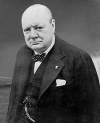
Everything is most friendly here, but the Balkans are in a sad tangle. Tito, having lived under our protection for three or four months at Vis, suddenly departed, leaving no address, but keeping sentries over his cave to make out that he was still there. He then proceeded to Moscow, where he conferred, and yesterday M. Molotov confessed this fact to Mr. Eden. The Russians attribute this graceless behavior to Tito's suspicious peasant upbringing, and say they did not tell us out of respect for his wish for secrecy.
The Bulgarians are treating our people ill, having arrested some of our officers remaining both in Greece and Yugoslavia. I saw a tale of their having treated very cruelly American officers when prisoners of theirs. Russian attitude is that they are of course willing to indict Bulgaria for her many offences, but only in the spirit of a loving parent: "This hurts me more than it does you." They are taking great interest in Hungary, which, they mentioned erroneously, was their neighbor. They claim fullest responsibility in Rumania, but are prepared largely to disinterest themselves in Greece. All these matters are being flogged out by Mr. Eden and Molotov . . . .
We have so many bones to pick about the Balkans at the present time that we would rather carry the matter a little further a deux in order to be able to talk more bluntly than at a larger gathering. I will cable fully to the president about this in a day or two. Will you very kindly show this to him? I shall be very glad to hear from him.
Private First Class Desmond T. Doss of Lynchburg, Virginia, is presented the Congressional Medal of Honor for outstanding bravery as a medical corpsman, the first conscientious objector in American history to receive the nation's highest military award.
When called on by his country to fight in World War II, Doss, a dedicated pacifist, registered as a conscientious objector. Eventually sent to the Pacific theater of war as a medical corpsman, Doss voluntarily put his life in the utmost peril during the bloody battle for Okinawa, saving dozens of lives well beyond the call of duty. (History.com)
1951:

The first serious planning for the exploration of space takes place at the Hayden Planetarium in New York City. Writer Willy Ley (above), who had left Germany before the war and never returned, coordinates this Space Travel Symposium. While he and Werner von Braun had both been members of some of the same groups of rocket enthusiasts in Germany, the two had never been friends. Among the guests at the Symposium are Arthur C. Clarke, R. P. Haviland, Oscar Schacter, Heinz Haber, and two writers from Collier's Weekly Magazine. Von Braun does not attend. See: November 6-9, 1951. (Piszkiewicz)
[See: Wunderwaffen: Hitler's Deception and the History of Rocketry.] 1960 Cold War: Nikita Khrushchev throws a tantrum: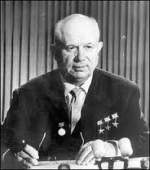
In one of the most surreal moments in the history of the Cold War, Russian leader Nikita Khrushchev removes his shoe and pounds a table with it in protest against a speech critical of Soviet policy in Eastern Europe. (History.com)
1946 Death:Gen. Joseph Stilwell:
On this day in 1946, Gen. Joseph W. Stilwell, the man who commanded the U.S. and Chinese Nationalist resistance to Japanese incursions into China and Burma, dies today at age 63.
Born March 19, 1883, in Palatka, Florida, and a graduate of the West Point Military Academy, Stilwell began distinguishing himself early in his career. In World War I, he served with the American Expeditionary Force in Europe, as well as in the Philippines. He was also a student of the Chinese language, which garnered him a position as military attache in Peking from 1935 to 1939. It was during the 1930s that Stilwell began to bond with the Chinese peasantry—and developed an infamous distrust, if not contempt, for Chinese political leadership. Known for his straight-talking manner and as a man who did not suffer fools gladly, he made no qualms about his dislike for Chinese Nationalist leader Chiang Kai-shek, who Stilwell considered corrupt and greedy (and whom he nicknamed "the Peanut").
Nevertheless, when World War II broke out, Stilwell reluctantly accepted Chiang's offer to become commander of U.S. Army forces in China and Burma-as well as to become Chiang's chief of staff. Stilwell also supervised the dispersion of American Land-Lease shipments to China, much-needed supplies for the war effort that Chiang wanted funneled through his office.
Stilwell's initial military operation, to keep open the Burma Road between India and China and to repel Japanese incursions into Burma, failed. The operation in Burma was so disastrous that Chinese forces under his command stopped taking orders. And as Allied supplies to China were being strangled (the Burma Road was the necessary shipping route), Stilwell and his forces were forced to retreat into India. "We got run out of Burma, and it is humiliating as hell," the general later admitted.
Further attempts by Stilwell to rally Chinese forces against the Japanese in both Burma and China were often thwarted by both Chiang, who was more concerned about the communist threat of Mao Tse-tung, and not allowing his ultimate authority to be usurped by the Americans, and the American Air Force, which, naturally, wanted to divert the war effort from the ground to the air.
Stilwell did manage to lead Chinese divisions to retake Myitakyina, and its airfield, from Japanese control, rebuilding the Ledo Road, a military highway in India that led into Burma (the road was later renamed Stilwell Road). But conflicts with Chiang resulted in Stilwell's removal in 1944. He then served as commander of the 10th Army on Okinawa, ultimately receiving the surrender of 100,000 Japanese troops in the Ryukyu Islands, in southern Japan. Stilwell finished off his career as commander of the 6th Army. The man who Gen. George C. Marshall declared "far-sighted" and "one of the exceptionally brilliant and cultured men in the Army . . . qualified for any command in peace or war," died in San Francisco, with his nation at peace. (History.com)
Edited by Levi Bookin (Copy editor)
levi.bookin@gmail.com



Click to join 3rdReichStudies



Disclaimer: This site includes diverse and controversial materials--such as excerpts from the writings of racists and anti-Semites--so that its readers can learn the nature and extent of hate and anti-Semitic discourse. It is our sincere belief that only the informed citizen can prevail over the ignorance of Racialist "thought." Far from approving these writings, this site condemns racism in all of its forms and manifestations.
Fair Use Notice: This site may contain copyrighted material the use of which has not always been specifically authorized by the copyright owner. We are making such material available in our efforts to advance understanding of historical, political, human rights, economic, democracy, scientific, environmental, and social justice issues, etc. We believe this constitutes a "fair use" of any such copyrighted material as provided for in section 107 of the US Copyright Law. In accordance with Title 17 U.S.C. Section 107, the material on this site is distributed without profit to those who have expressed a prior interest in receiving the included information for research and educational purposes. If you wish to use copyrighted material from this site for purposes of your own that go beyond 'fair use', you must obtain permission from the copyright owner.
Please Note: The list-owner and the moderator of 3rdReichStudies are not responsible for, and do not necessarily approve of, the random ads placed on our pages by our web server. They are the unfortunate price one pays for a 'free' website.